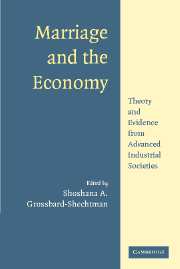Book contents
- Frontmatter
- Contents
- List of Figures
- List of Tables
- List of Contributors
- Foreword
- Acknowledgments
- Marriage and the Economy
- 1 Marriage and the Economy
- PART I THE ECONOMICS OF MARRIAGE AND DIVORCE
- PART II EFFECTS OF MARRIAGE ON INCOME USES
- 5 Control over Money in Marriage
- 6 Marriage, Assets, and Savings
- 7 The Economics of Child Support
- 8 Marriage Prospects and Welfare Use
- PART III EFFECTS OF MARRIAGE ON TIME USES
- PART IV MARRIAGE AND THE MACROECONOMY
- Index
5 - Control over Money in Marriage
Published online by Cambridge University Press: 07 December 2009
- Frontmatter
- Contents
- List of Figures
- List of Tables
- List of Contributors
- Foreword
- Acknowledgments
- Marriage and the Economy
- 1 Marriage and the Economy
- PART I THE ECONOMICS OF MARRIAGE AND DIVORCE
- PART II EFFECTS OF MARRIAGE ON INCOME USES
- 5 Control over Money in Marriage
- 6 Marriage, Assets, and Savings
- 7 The Economics of Child Support
- 8 Marriage Prospects and Welfare Use
- PART III EFFECTS OF MARRIAGE ON TIME USES
- PART IV MARRIAGE AND THE MACROECONOMY
- Index
Summary
The traditional economic view of the household is that, although there are differences in the roles men and women play in marriage, these differences represent an efficient division of labor, and both equally enjoy the rewards from cooperation. To put it another way, it is assumed that income received during marriage is “pooled” in a common pot. In economic theory, this assumption is made whenever a married couple is treated as if they have a common budget constraint. At the policy level, this assumption is reflected in, for example, measurements of low income or income inequality that are based only on family income, or the use of a married couple's total income to determine tax liabilities or eligibility for government benefits.
Yet a growing body of research casts doubt on the traditional economic view of marriage. More and more, scholars are beginning to see marriage as a “cooperative conflict” (Amartya Sen 1990). Spouses gain when they cooperate in raising children, sharing a home, or dividing labor so work can be done more efficiently. Yet spouses are in conflict over how the gains from marriage are to be distributed. For example, who gets to spend the money saved by preparing meals at home?
The chapters in this book describe several theories about marriage, and their predictions as to how the conflict will be resolved. For example, Shoshana Grossbard-Shechtman (1993, this volume), argues that the “wage” each spouse receives for his or her part of the marriage is the outcome of a “marriage market” process.
- Type
- Chapter
- Information
- Marriage and the EconomyTheory and Evidence from Advanced Industrial Societies, pp. 105 - 128Publisher: Cambridge University PressPrint publication year: 2003
- 28
- Cited by



